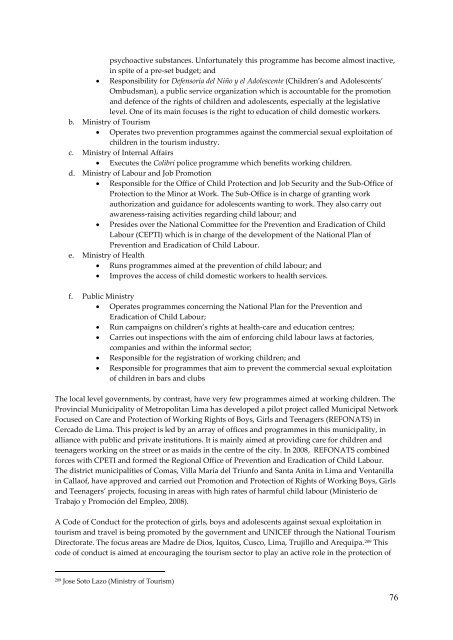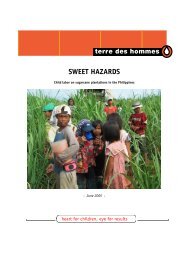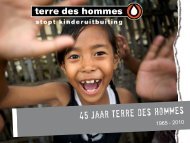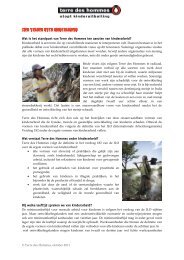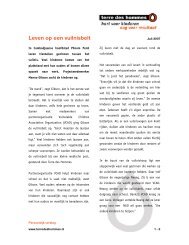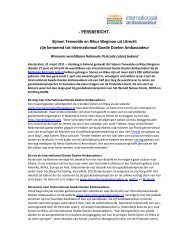Untitled - Terre des Hommes
Untitled - Terre des Hommes
Untitled - Terre des Hommes
- No tags were found...
You also want an ePaper? Increase the reach of your titles
YUMPU automatically turns print PDFs into web optimized ePapers that Google loves.
psychoactive substances. Unfortunately this programme has become almost inactive,<br />
in spite of a pre-set budget; and<br />
Responsibility for Defensoría del Niño y el Adolescente (Children’s and Adolescents’<br />
Ombudsman), a public service organization which is accountable for the promotion<br />
and defence of the rights of children and adolescents, especially at the legislative<br />
level. One of its main focuses is the right to education of child domestic workers.<br />
b. Ministry of Tourism<br />
Operates two prevention programmes against the commercial sexual exploitation of<br />
children in the tourism industry.<br />
c. Ministry of Internal Affairs<br />
Executes the Colibri police programme which benefits working children.<br />
d. Ministry of Labour and Job Promotion<br />
Responsible for the Office of Child Protection and Job Security and the Sub-Office of<br />
Protection to the Minor at Work. The Sub-Office is in charge of granting work<br />
authorization and guidance for adolescents wanting to work. They also carry out<br />
awareness-raising activities regarding child labour; and<br />
Presi<strong>des</strong> over the National Committee for the Prevention and Eradication of Child<br />
Labour (CEPTI) which is in charge of the development of the National Plan of<br />
Prevention and Eradication of Child Labour.<br />
e. Ministry of Health<br />
Runs programmes aimed at the prevention of child labour; and<br />
Improves the access of child domestic workers to health services.<br />
f. Public Ministry<br />
Operates programmes concerning the National Plan for the Prevention and<br />
Eradication of Child Labour;<br />
Run campaigns on children’s rights at health-care and education centres;<br />
Carries out inspections with the aim of enforcing child labour laws at factories,<br />
companies and within the informal sector;<br />
Responsible for the registration of working children; and<br />
Responsible for programmes that aim to prevent the commercial sexual exploitation<br />
of children in bars and clubs<br />
The local level governments, by contrast, have very few programmes aimed at working children. The<br />
Provincial Municipality of Metropolitan Lima has developed a pilot project called Municipal Network<br />
Focused on Care and Protection of Working Rights of Boys, Girls and Teenagers (REFONATS) in<br />
Cercado de Lima. This project is led by an array of offices and programmes in this municipality, in<br />
alliance with public and private institutions. It is mainly aimed at providing care for children and<br />
teenagers working on the street or as maids in the centre of the city. In 2008, REFONATS combined<br />
forces with CPETI and formed the Regional Office of Prevention and Eradication of Child Labour.<br />
The district municipalities of Comas, Villa María del Triunfo and Santa Anita in Lima and Ventanilla<br />
in Callaof, have approved and carried out Promotion and Protection of Rights of Working Boys, Girls<br />
and Teenagers’ projects, focusing in areas with high rates of harmful child labour (Ministerio de<br />
Trabajo y Promoción del Empleo, 2008).<br />
A Code of Conduct for the protection of girls, boys and adolescents against sexual exploitation in<br />
tourism and travel is being promoted by the government and UNICEF through the National Tourism<br />
Directorate. The focus areas are Madre de Dios, Iquitos, Cusco, Lima, Trujillo and Arequipa. 209 This<br />
code of conduct is aimed at encouraging the tourism sector to play an active role in the protection of<br />
209<br />
Jose Soto Lazo (Ministry of Tourism)<br />
76


